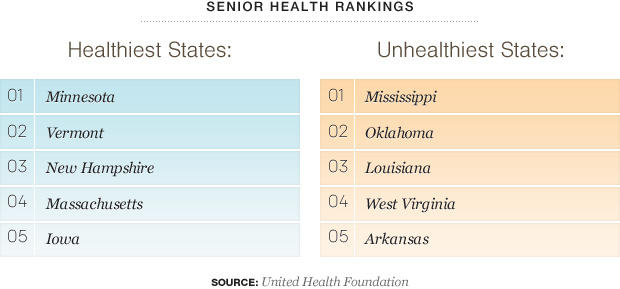America's senior health rankings: Mississippi last, what's first?
A comprehensive report of senior citizen's health adds more urgency to a crisis facing the U.S. health care system: an aging baby boomer population with troubling rates of chronic illnesses.
The United Health Foundation's 2013 "America's Health Rankings Senior Report" provides a state-by-state snapshot of how healthy senior citizens are and what types of health care resources they have available.
The group last December unveiled America's Health Rankings, a look at the nation's health. It found Americans are living longer, but many are living sicker.
"What worries us in particular about this year's report is that some key risk factors that are driving up preventable chronic illness are getting worse," Dr. Reed Tuckson, chief of medical affairs for United Health Group, told CBSNews.com last year.
This year's report saw that troubling trend continue in seniors, finding about 80 percent of them had at least one chronic disease, while 50 percent of seniors possessed at least two or more chronic conditions. That's worrisome, because the number of U.S. seniors is expected to grow more than 50 percent between 2015 and 2030.
America's Senior Health Rankings
"We are measuring senior health in order to help improve it," Tuckson said in a press release for the new report, which was published on May 29. "States with healthy seniors have a combination of positive personal behaviors and community support, which demonstrate that improving senior health will only come about by acting on individual, family, community and state levels."
The report tracked health of U.S. adults aged 65 and older across 34 different measures of individual and community health, including rates of obesity, physical activity, smoking, chronic diseases like diabetes and death rates among seniors per state, and access to food, health care providers and prescription drug coverage. Data came from 12 government agencies and research organizations including The U.S. Department of Health and Human Services, the U.S. Department of Labor and the Commonwealth Fund.
The report found Minnesota was the healthiest state for seniors overall, with a large percentage of seniors reporting they are in very good or excellent health, high rates of annual dental visits and creditable drug coverage, and low rates of hospitalization for hip fractures and seniors at risk of hunger. The state's senior population is expected to grow 54 percent between 2015 and 2030, according to the report, which may provide challenges to health care.
Rounding out the healthiest states for seniors in order were Vermont, New Hampshire, Massachusetts and Iowa.
The least healthy state for seniors? Mississippi, which was found to have a high rate of premature death among adults 65 and older, a low rate of seniors who report good health or go to the dentist, and a high rate of seniors in poverty who are at risk for hunger. Mississippi, however, did do well for low rates of chronic drinking and high flu vaccine rates. The senior population in state is expected to grow more than 46 percent over the next 15-plus years.
"All states have their share of strengths and challenges, and we must make a concerted effort to learn from one another and replicate what works," said Tuckson.
The report found some other surprising trends depending on the state.
The highest percentages of chronic disease were found in Florida (43.5 percent of senior residents) and New Jersey (43.2 percent) while the lowest rates were found in Alaska (20.9 percent) and Wyoming (21.5 percent).
Physical inactivity was most common in Tennessee (41.3 percent of state seniors) and least common in Colorado (20.5 percent). Obesity affected 23.5 percent of all senior adults in the U.S., but a closer look showed the lowest rates were in Hawaii (16.9 percent) and the highest were in Michigan. (29.5 percent)
Physical inactivity increases risks for cardiovascular disease, diabetes, hypertension, obesity and early death.
Poverty, which could prevent seniors from getting achieving their health needs, was lowest among seniors in Alaska (5.1 percent) and highest in Mississippi (13.5 percent)
The full report from United Health Foundation can be found here.


